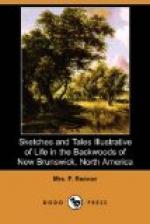In this land, young as it is, there are those who mourn for the times gone by, and consider the increasing settlement of the country as their worst evil; wilfully closing their eyes against improvement, they see not the wide fields, waving fair with grass and wheat, but think it was better when the dense forest shut out the breeze and reflected the sunbeams down with greater strength on the corn, so dearly loved by the American. They hear not the sound of the busy mill when they mourn for the fish-deserted brooks, and forget that when moose meat was more plentiful than now bread stuffs were ground in the wearying hand-mill. One of this respectable class of grumblers was our present acquaintance, and here he sat in his porch, with aspect grave as the stoics—his tall form, although in ruins now, was stately in decay as the old forest’s pines. His head was such as a phrenologist would have loved to look upon; the true platonic breadth of brow, and lofty elevation of the scalp silvered over, told of a mind fitting in its magnitude to spring from that gigantic continent whose streams are mighty rivers and whose lakes are seas; but, valueless as these, when embosomed in their native woods, were the treasures of the old man’s mind, unawakened as they were by education, and unpolished even by contact with the open world, yet still, amid the crust contracted in the life he had led, rays of the inward diamond glittered forth. The wilderness had always been his dwelling—in the land he had left, his early days had been passed in hunting the red deer or the red man on the Prairie fields—there, with the true spirit of the old American, he had learned to treat the Indian as “varment,” although a kindlier feeling was awakened towards them in this




